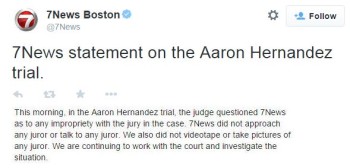
Channel 7's statement denying harassment (Credit: Channel 7, Twitter)
Boston’s Channel 7 WHDH-TV was called out by a Massachusetts judge for “juror harassment” in the Aaron Hernandez murder trial.
The judge, Bristol Superior Court Judge E. Susan Garsh, said in court that two jurors said they saw a WHDH van watching and trying to “follow them,” the Boston Globe reported. As evidence, one of the jurors wrote down the vehicle’s license plate.
The van “slowed down as jurors were pulling out,” Garsh said. “It was looking at the jurors [in a way] the jurors deemed inappropriate.”
“This is an extraordinarily serious matter,” Garsh said, according to the Globe. Garsh called for someone from the station to testify about the incident and banned all media from contacting jurors.
The incident could have caused a mistrial but since the jurors said it wouldn’t affect their ability, Garsh didn’t dismiss the jurors.
“You cannot approach, question, harass, or follow any juror,” Garsh said.
Had WHDH not addressed the issue with the judge, Garsh said she’d ban the station from her court.
Channel 7’s lawyer pointed iMediaEthics to the station’s statement on its website.
7 News denied the claims of harassment in a statement posted on Twitter, but one of its staffers did admit he followed the jurors.
WHDH’s Robert Cusanelli confirmed he did go to the jury parking lot but didn’t contact them. Cusanelli was banned from the court because of his actions.
Channel 7 reported Cusanelli testified that he followed the jurors to their parking lot, but that he did it on his own. When WHDH’s lawyer Michael Gass asked him if “anybody from WHDH instructed you to follow the bus?”, Cusanelli said, “Not specifically but I knew they felt that was good information to have.”
In a statement, WHDH said “7News did not approach any juror or talk to any juror. We also did not videotape or take pictuers of any juror.”
7News statement on the Aaron Hernandez trial. pic.twitter.com/SwJAq3Yqg1
— 7News Boston (@7News) April 9, 2015
WHDH lawyer Gass said he accepted the decision to ban Cusanelli. “I think it was [fair], yes,” he said according to WHDH, adding that Cusanelli “certainly had no intention of interacting with the jurors in any way.”
WHDH also said in court that it was a “snap decision” made by Cusanelli
“Channel 7 as a news organization obviously takes these issues very seriously, they take their role in reporting important matters such as this trial seriously. But they also take very seriously protecting the provenance of the jury. I think what happened here in fairness, your honor, is an experienced photographer made a snap decision at the time that in hindsight was not a very good one and is sorry.”
Cusanelli admitted it was wrong. “I see now it was a mistake,” he said, according to the Associated Press.
Hernandez,a former New England Patriots football player, is accused of murdering Odin Lloyd and unlawful possession of a firearm and ammunition but denies the charges.
iMediaEthics is writing to the court for comment.






